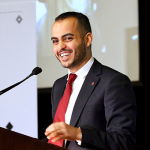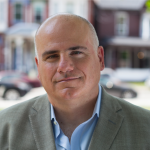Keynote Speakers
Dr. Andrea Tricco

Andrea C. Tricco (PhD, MSc) is a Scientist and Director of the Knowledge Synthesis Team in the Knowledge Translation Program of the Li Ka Shing Knowledge Institute, St. Michael’s Hospital. She is an Associate Professor at the University of Toronto in the Dalla Lana School of Public Health & Institute of Health Policy, Management, and Evaluation. She is also a Co-Director & Adjunct Associate Professor for the Queen’s Collaboration for Health Care Quality Joanna Briggs Institute (JBI) Centre of Excellence at Queen’s University.
Dr. Tricco is a knowledge synthesis methodologist with >235 publications in this area, including papers in high-impact journals (e.g., British Medical Journal , Journal of the American Medical Association, Lancet). She currently holds a Tier 2 Canada Research Chair in Knowledge Synthesis. She has been commissioned by several agencies to conduct knowledge synthesis, such as the World Health Organization and Ontario Ministry of Health and Long-term Care. Her research has been covered by major media outlets, such as CTV News, Global News, and Radio Canada International. She has presented at >155 local, national, and international meetings and led >50 reports for decision-making agencies. She is also an Associate Editor for the Journal of Clinical Epidemiology, and Systematic Reviews; and sits on the Editorial Board for BMC Medicine and JBI Evidence Synthesis. She developed and teaches an online systematic review course that >535 students have completed.
Dr. Laura Rosella
 Laura Rosella, PhD, MHSc, is the Principal Investigator and Scientific Director of the Population Health Analytics Lab. She is an Associate Professor in the Dalla Lana School of Public Health at the University of Toronto, where she holds Canada Research Chair in Population Health Analytics. She is a member of the Royal Society of Canada’s (RSC) College of New Scholars, the Stephen Family Research Chair in Community Health at the Institute for Better Health, Trillium Health Partners, the Education Lead for the Temerty Centre for Artificial Intelligence Research and Education in Medicine (T-CAIREM), and the Associate Director of Education and Training at the University of Toronto’s Data Science Initiative (DSI). Her additional scientific appointments include Faculty Affiliate at the Vector Institute and the Schwartz Reisman Institute, and Site Director for ICES UofT. Her research interests include population health and health equity, data science, predictive models to support public health planning, knowledge translation and evaluation, and population health management. She has authored over 200 peer-reviewed publications in the areas of epidemiology, population health and health services research. She has been awarded several national grants, including a CIHR Foundation grant to support her population health analytics research program. Notably, Dr. Rosella was awarded the Brian MacMahon Early Career Epidemiology Award by the Society for Epidemiologic Research and was named one of Canada’s Top 40 Under 40. Her research has been featured by several media outlets, including Forbes, Newsweek, Reuters, CBC, CTV, The National Post, The Globe and Mail, and The Toronto Star
Laura Rosella, PhD, MHSc, is the Principal Investigator and Scientific Director of the Population Health Analytics Lab. She is an Associate Professor in the Dalla Lana School of Public Health at the University of Toronto, where she holds Canada Research Chair in Population Health Analytics. She is a member of the Royal Society of Canada’s (RSC) College of New Scholars, the Stephen Family Research Chair in Community Health at the Institute for Better Health, Trillium Health Partners, the Education Lead for the Temerty Centre for Artificial Intelligence Research and Education in Medicine (T-CAIREM), and the Associate Director of Education and Training at the University of Toronto’s Data Science Initiative (DSI). Her additional scientific appointments include Faculty Affiliate at the Vector Institute and the Schwartz Reisman Institute, and Site Director for ICES UofT. Her research interests include population health and health equity, data science, predictive models to support public health planning, knowledge translation and evaluation, and population health management. She has authored over 200 peer-reviewed publications in the areas of epidemiology, population health and health services research. She has been awarded several national grants, including a CIHR Foundation grant to support her population health analytics research program. Notably, Dr. Rosella was awarded the Brian MacMahon Early Career Epidemiology Award by the Society for Epidemiologic Research and was named one of Canada’s Top 40 Under 40. Her research has been featured by several media outlets, including Forbes, Newsweek, Reuters, CBC, CTV, The National Post, The Globe and Mail, and The Toronto Star
Dr. Fiona Miller
 Dr. Fiona A. Miller is a Professor of Health Policy in the Institute of Health Policy, Management and Evaluation in the Dalla Lana School of Public Health at the University of Toronto. She holds the Chair in Health Management Strategies and is a Connaught Scholar. Miller directs the Centre for Sustainable Health Systems at the University of Toronto and a national initiative for climate action and awareness in healthcare: CASCADES. In these roles, she leads and supports efforts to improve the sustainability of health systems through research, education, practice change and policy development. As a policy scholar, Miller brings a critical political economy perspective to the analysis of technological innovation and sustainability transitions.
Dr. Fiona A. Miller is a Professor of Health Policy in the Institute of Health Policy, Management and Evaluation in the Dalla Lana School of Public Health at the University of Toronto. She holds the Chair in Health Management Strategies and is a Connaught Scholar. Miller directs the Centre for Sustainable Health Systems at the University of Toronto and a national initiative for climate action and awareness in healthcare: CASCADES. In these roles, she leads and supports efforts to improve the sustainability of health systems through research, education, practice change and policy development. As a policy scholar, Miller brings a critical political economy perspective to the analysis of technological innovation and sustainability transitions.
“Lessons from Public Health’s Past” Panelists:
Dr. Arif Jetha
 Arif Jetha PhD is a Scientist at the Institute for Work & Health and Associate Professor at the Dalla Lana School of Public Health. University of Toronto. His research spans population health, systems science, and social policy to examine how the future of work affects vulnerable workers. He earned his PhD from University of Toronto and holds an MSc from the London School of Economics and Political Science. He was the recent recipient of the six-year Stars Early Career Salary Award from the Arthritis Society, and he holds multiple Canadian Tri-Council grants as principal investigator. He is a mixed-methodologist and has experience leading interdisciplinary research and partnership teams.
Arif Jetha PhD is a Scientist at the Institute for Work & Health and Associate Professor at the Dalla Lana School of Public Health. University of Toronto. His research spans population health, systems science, and social policy to examine how the future of work affects vulnerable workers. He earned his PhD from University of Toronto and holds an MSc from the London School of Economics and Political Science. He was the recent recipient of the six-year Stars Early Career Salary Award from the Arthritis Society, and he holds multiple Canadian Tri-Council grants as principal investigator. He is a mixed-methodologist and has experience leading interdisciplinary research and partnership teams.
Dr. Todd Coleman
 Todd Coleman is an Assistant Professor in the Department of Health Sciences at Wilfrid Laurier University. His graduate training is in Epidemiology and Biostatistics (Western University). Prior to joining the Department of Health Sciences, he worked as a Public Health Epidemiologist with the Middlesex-London Health Unit in London, Ontario. His research focuses on health equity and health care access and use, with specific interests in experiences of minorities classified based on sexual orientation, gender identity and expression (SOGIE). He also works with various community representatives on community-based research initiatives which assist underserved populations conduct rigorous community- and policy-relevant research.
Todd Coleman is an Assistant Professor in the Department of Health Sciences at Wilfrid Laurier University. His graduate training is in Epidemiology and Biostatistics (Western University). Prior to joining the Department of Health Sciences, he worked as a Public Health Epidemiologist with the Middlesex-London Health Unit in London, Ontario. His research focuses on health equity and health care access and use, with specific interests in experiences of minorities classified based on sexual orientation, gender identity and expression (SOGIE). He also works with various community representatives on community-based research initiatives which assist underserved populations conduct rigorous community- and policy-relevant research.
Dr. Ahmad Firas Khalid
 Ahmad Firas Khalid is a medical doctor, assistant professor in global health at York University, a health policy and system researcher and lecturer, and a knowledge translation professional. Firas completed his medical degree at St. George’s University School of Medicine and his PhD in Health Policy at McMaster University. Firas worked as a Senior Research Manager at Evidence Aid working on creating a World Health Organization (WHO) Knowledge Hub on emergency disasters research management and with the Pan American Health Organization (PAHO) on the creation of Resilient Health Systems collection to advise member states. He is also a CIHR Health System Impact Fellow and a Mitacs Elevate Training Fellow working on Implementation of efforts to support real-time evidence use in humanitarian practice at The Canadian Red Cross. Firas is a Board Member for Doctors Without Borders where his responsibility is to set the strategic direction for the entire Canadian branch of the organization.
Ahmad Firas Khalid is a medical doctor, assistant professor in global health at York University, a health policy and system researcher and lecturer, and a knowledge translation professional. Firas completed his medical degree at St. George’s University School of Medicine and his PhD in Health Policy at McMaster University. Firas worked as a Senior Research Manager at Evidence Aid working on creating a World Health Organization (WHO) Knowledge Hub on emergency disasters research management and with the Pan American Health Organization (PAHO) on the creation of Resilient Health Systems collection to advise member states. He is also a CIHR Health System Impact Fellow and a Mitacs Elevate Training Fellow working on Implementation of efforts to support real-time evidence use in humanitarian practice at The Canadian Red Cross. Firas is a Board Member for Doctors Without Borders where his responsibility is to set the strategic direction for the entire Canadian branch of the organization.
In the past, Firas worked as a Senior Research and Learning Consultant at the Canadian Red Cross working on Epidemic Prevention and Control COVID-19 research. In addition, Firas previously worked as a Health Policy Researcher at the Research Unit on Humanitarian Stakes and Practices (UREPH) at Médecins Sans Frontières (MSF) in Geneva, Switzerland. He also worked in the department of Child and Maternal Health at the World Health Organization (WHO) in Geneva, Switzerland. Firas is the Founder and Executive Director of Knowledge Translation Hub – a knowledge synthesis hub designed to meet the demands of decision-makers and organizations.
Dr. Evelyn Rubin
 Dr. Evelyn Rubin, MD, CCFP, FCFP, is a Family Physician practicing in downtown Toronto and the lead physician of her Family Health Organization. She received her medical degree from the University of Toronto and completed her residency in Family Medicine at North York General Hospital. She is an Assistant Professor in the Department of Family and Community Medicine at the University of Toronto and teaches medical students in all four years. During the COVID-19 pandemic, she worked for the COVIDCare@Home clinic, a virtual clinic to monitor and manage COVID patients through Women’s College Hospital, and also worked in many COVID vaccine clinics. She enjoys trivia in her spare time, and is a two-time Jeopardy! Champion.
Dr. Evelyn Rubin, MD, CCFP, FCFP, is a Family Physician practicing in downtown Toronto and the lead physician of her Family Health Organization. She received her medical degree from the University of Toronto and completed her residency in Family Medicine at North York General Hospital. She is an Assistant Professor in the Department of Family and Community Medicine at the University of Toronto and teaches medical students in all four years. During the COVID-19 pandemic, she worked for the COVIDCare@Home clinic, a virtual clinic to monitor and manage COVID patients through Women’s College Hospital, and also worked in many COVID vaccine clinics. She enjoys trivia in her spare time, and is a two-time Jeopardy! Champion.
“Future of Public Health” Panelists
Dr. Andrea Cortinois
 Over the past 30 years, Dr. Cortinois has worked as a journalist, researcher, educator, and manager of health-related interventions on four continents, mainly in the Global South. He has earned a Master of Public Health degree with a global health emphasis in the UK, and a Ph.D. in the Institute of Health Policy, Management, and Evaluation at the University of Toronto. Currently, he is an Assistant Professor, Teaching Stream, cross appointed between the Human Biology Program, Faculty of Arts and Science, and the Dalla Lana School of Public Health. He teaches both graduate and undergraduate courses in global migration and health and global health.
Over the past 30 years, Dr. Cortinois has worked as a journalist, researcher, educator, and manager of health-related interventions on four continents, mainly in the Global South. He has earned a Master of Public Health degree with a global health emphasis in the UK, and a Ph.D. in the Institute of Health Policy, Management, and Evaluation at the University of Toronto. Currently, he is an Assistant Professor, Teaching Stream, cross appointed between the Human Biology Program, Faculty of Arts and Science, and the Dalla Lana School of Public Health. He teaches both graduate and undergraduate courses in global migration and health and global health.
Dr. Cortinois’ research interests include the impact of the global economic regime and the planetary environmental crises on displacement; migration as an intermediate determinant of health, with particular attention given to mechanisms of inclusion/exclusion, precariousness, and detention/deportation as mediating factors; and the social costs of migration in countries of origin. As an integral part of his academic work, he is also interested in issues of precarity, quality of life, and scholarship in the context of the neoliberal university and in the responsibilities of educators in the Anthropocene.
Dr. Clement Ma

Dr. Clement Ma is an Independent Scientist (Biostatistician) and co-Director of the Biostatistics Core Services at the Centre for Addiction and Mental Health (CAMH). He is an Assistant Professor of Biostatistics at the Dalla Lana School of Public Health. He completed his Ph.D. and post-doctoral training in Biostatistics at the University of Michigan in 2015. He was the Lead Biostatistician at the Dana-Farber/Boston Children’s Cancer and Blood Disorders Center and an Assistant Professor of Pediatrics at Harvard Medical School from 2015 to 2020. Dr. Ma’s research focuses on developing and implementing innovative statistical methods to improve the accuracy and efficiency of clinical trials. His novel Bayesian adaptive designs have been implemented in multiple ongoing pediatric trials. Currently at CAMH, he is developing novel master protocol designs for trials in dementia prevention, Alzheimer’s disease, and anxiety disorders. He has extensive experience in statistical consulting with over 90 peer-reviewed publications across oncology, hematology, diabetes, and mental health.
Dr. Ketan Shankardass
 Ketan Shankardass is an associate professor in the Department of Health Sciences at Wilfrid Laurier University, where he leads the Health Equity Systems Interventions research group. He is also an associate scientist at the MAP Centre for Urban Health Solutions at St. Michael’s Hospital. He received an MHSc in Community Health and Epidemiology from the University of Toronto and a PhD in Epidemiology from the University of Southern California.
Ketan Shankardass is an associate professor in the Department of Health Sciences at Wilfrid Laurier University, where he leads the Health Equity Systems Interventions research group. He is also an associate scientist at the MAP Centre for Urban Health Solutions at St. Michael’s Hospital. He received an MHSc in Community Health and Epidemiology from the University of Toronto and a PhD in Epidemiology from the University of Southern California.
Dr. Shankardass draws on social epidemiology, health geography and community psychology to understand the drivers of health inequity from “cell to society.” He views research as a way to support the uptake of more equitable health systems. In the future, he hopes to see more governments tackling sticky public health problems by working in collaboration with other government and non-government organizations (intersectoral action), and more planning to address chronic stress through greater community resilience. He also thinks the future of public health itself depends on improving public understanding about public health adjacent problems.
Dr. Alison Paprica
 Alison Paprica is Professor (Adjunct) and a Senior Fellow at the University of Toronto’s Institute for Health Policy, Management and Evaluation. She currently works for Health Data Research Network Canada and ICES and is Principal of the boutique consultancy Research Project Management. She is also a Senior Fellow at Massey College and a member of the International Advisory Board for Health Data Research UK.
Alison Paprica is Professor (Adjunct) and a Senior Fellow at the University of Toronto’s Institute for Health Policy, Management and Evaluation. She currently works for Health Data Research Network Canada and ICES and is Principal of the boutique consultancy Research Project Management. She is also a Senior Fellow at Massey College and a member of the International Advisory Board for Health Data Research UK.
Alison’s previous roles include inaugural Vice President, Health Strategy and Partnerships at the Vector Institute for Artificial Intelligence; Director, Strategic Partnerships at ICES; and Director of the Planning, Research & Analysis Branch at the Ontario Ministry of Health where she was responsible for up to $60 million annual applied health research investment and in-house knowledge translation activities to bring research findings into policy and practice. Prior to working in the public sector, she held scientist and R&D management positions at three different international pharmaceutical companies.
Alison holds an Honours Combined BSc in biochemistry and chemistry (McMaster), a PhD in organic chemistry (Western University). Her main research interests are data governance and research data infrastructure, public involvement in data-intensive health R&D, evidence-informed policy, and the leadership and management of research as a topic in its own right.
Workshop Facilitators
Allan McKee
 Allan McKee is the Communications Specialist for the Healthy Design City project. He develops content for the project and its tools and leads their outreach activities. He has a background working in public policy and healthcare communications.
Allan McKee is the Communications Specialist for the Healthy Design City project. He develops content for the project and its tools and leads their outreach activities. He has a background working in public policy and healthcare communications.
Alexxa Abi-Jaoude
 Alexxa Abi-Jaoude (she/her) earned her MPH at Simon Fraser University focusing on the social determinants of health and violence against women. She is a Communications Coordinator in Education at CAMH. Working in the area violence, substance use and mental health for 15 years, Alexxa has expertise in participatory action research, co-design research; workshop facilitation; developing public/consumer health resources; and program development and evaluation.
Alexxa Abi-Jaoude (she/her) earned her MPH at Simon Fraser University focusing on the social determinants of health and violence against women. She is a Communications Coordinator in Education at CAMH. Working in the area violence, substance use and mental health for 15 years, Alexxa has expertise in participatory action research, co-design research; workshop facilitation; developing public/consumer health resources; and program development and evaluation.
Claire Perry
 Claire Perry (she/her) is a Youth Engagement Specialist affiliated with the McCain Centre for Child, Family, and Youth Mental Health at the Centre for Addiction and Mental Health. She currently supports projects regarding both vaccine hesitancy in youth living with mental health challenges and mental health equity education. Apart from these projects, Claire has interests in collective healing, stigma reduction, and knowledge synthesis and co-creation.
Claire Perry (she/her) is a Youth Engagement Specialist affiliated with the McCain Centre for Child, Family, and Youth Mental Health at the Centre for Addiction and Mental Health. She currently supports projects regarding both vaccine hesitancy in youth living with mental health challenges and mental health equity education. Apart from these projects, Claire has interests in collective healing, stigma reduction, and knowledge synthesis and co-creation.
Maryam Faisal
 Maryam Faisal is a Master of Social Work candidate at the Lyle S. Hallman Faculty of Social Work, Wilfrid Laurier University. She currently works as a Project Manager of Anti-Hate Initiatives and Gender-based violence research for the Council of Agencies Serving South Asians (CASSA) where she is currently leading a project exploring the impacts of harmful masculinities on gender-based violence in the South Asian Canadian context. Previously, she led the National Campaign for Combatting Online Hate.
Maryam Faisal is a Master of Social Work candidate at the Lyle S. Hallman Faculty of Social Work, Wilfrid Laurier University. She currently works as a Project Manager of Anti-Hate Initiatives and Gender-based violence research for the Council of Agencies Serving South Asians (CASSA) where she is currently leading a project exploring the impacts of harmful masculinities on gender-based violence in the South Asian Canadian context. Previously, she led the National Campaign for Combatting Online Hate.
Jean-Paul Soucy
 Jean-Paul R. Soucy is a PhD candidate in the Dalla Lana School of Public Health studying infectious disease epidemiology with a focus on emerging sources of data for infectious disease surveillance. He is also a passionate advocate for open data and transparency in government. As co-founder of the COVID-19 Canada Open Data Working Group (opencovid.ca), Jean-Paul maintains a long-running COVID-19 dataset and the largest publicly available archive of COVID-19 data in Canada.
Jean-Paul R. Soucy is a PhD candidate in the Dalla Lana School of Public Health studying infectious disease epidemiology with a focus on emerging sources of data for infectious disease surveillance. He is also a passionate advocate for open data and transparency in government. As co-founder of the COVID-19 Canada Open Data Working Group (opencovid.ca), Jean-Paul maintains a long-running COVID-19 dataset and the largest publicly available archive of COVID-19 data in Canada.
Contact information:
For questions and feedback regarding the Dalla Lana School of Public Health’s Student-Led Conference, please contact: slc.dlsph@utoronto.ca